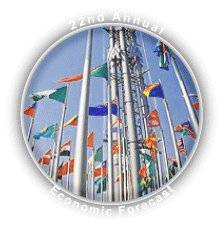
SMA 21st Annual Economic Forecast 2006 is my coverage of the SMA/Harvard Club annual confab featuring David Hale and Lyric Hughes-Hale
The Strategic Management Association and The Harvard Club jointly sponsored the Economic Forecast 2006 featuring David Hale and Lyric Hughes-Hale. David presented his encyclopedic knowledge and perspective on global economic trends, while Lyric shared her insights on China in Part II of the evening (she was the founder of China Online and has focused on China for several years.).
As usual, I present my notes, followed by my insights. Here are my notes from David’s presentation (Part I of the meeting).
[…]
Surprises in the Emerging Chinese Consumer Market highlights the Internet-powered practice of consumer collaboration and group buying for discounts.
“Chinese Consumers Overwhelm Retailers with Team Tactics,” The Wall Street Journal, February 28, 2006 is a perfect example of how mature market assumptions can lead to surprises in emerging markets. Chinese consumers increasingly meet on the Internet chat rooms to plan and coordinate a group buying strategy for a type of good or even brand. Then they go to the retailer as a group to extract significant group discounts. This practice is known as tuangou, or team purchase, and can play havoc with companies’ pricing strategies and margins, to say the least.
[…]
Last night I attended TiE Chicago’s “The Great Chicago Tech Debate,” which turned out to be a rousing panel discussion (no, that’s not necessarily an oxymoron 😉 replete with insights. As it was my first TiE (The Indus Entrepreneur) event, I enjoyed taking an informal survey of members afterwards, and everyone I spoke with found it extremely valuable (not awfully surprising, but still..). TiE, which was founded in The Valley and has chapters globally, is a network to support entrepreneurs. As its name suggests, many of its leaders originally hail from India, and many have founded, led or helped to launch successful start-ups that have leveraged offshore partners in India.
Although the setting of this tale is Chicago, its lessons will apply to many other cities, provinces or countries that find themselves in a global knowledge economy, with the need to form a vision to galvanize their citizens to make changes in order to succeed in the new environment. Two of the main challenges are: making the shift from the industrial economy to the knowledge economy and the need to differentiate to compete. “Technology” plays a supporting role, which we’ll discuss more in a minute. After some observations on the […]
At the MIT Enterprise Forum’s Innovation and Technology Forecast in Chicago Tuesday, there was significant discussion about China’s growth and what that would mean for innovation in Illinois. Many speakers also made references to the importance of catering to knowledge workers. Chunka Mui, Dan Ratner, Geoffrey Kasselman and Jerry Mitchell were panelists, and Jerry spends significant time in China. His admiration for what is happening in China was contagious and triggered the train of thought here.
[…]
The United States is a unique country in many ways, notably in its collective, pervasive idea of the “immigrant” experience. As everyone learns in Civics class, the majority of Americans immigrated to the U.S. within a relatively compressed time frame in order to gain economic, religious or other freedoms that they did not have at “home.” Moreover, the land was new, with only emerging cultural ideas and structures to impose themselves on the new arrivals. The immigrant experience was pervasive because the number of immigrants compared to the number of U.S.-born citizens was high during the 18th and 19th centuries. The immigration experience was therefore formative in the U.S. culture itself.
[…]
Much of what I write in this space will revolve around the new knowledge economy in which we increasingly find ourselves (no, I’m not talking about the “New Economy” of the 90s ;-). Therefore, I offer these thoughts on the 3.x economies in which we have lived.
The Knowledge Economy
A knowledge economy is fundamentally a new animal because its outputs are increasingly information-intensive services and “products.” Many of these products are infinitely scalable, like CDs, software or Webcasts. Selling additional “copies” of digital (music) is accomplished at virtually zero marginal cost for production and distribution. Of course, a knowledge economy also produces numerous industrial and agrarian goods, but the value of these goods is shifting toward information-intensive services that are related to the goods—away from the underlying goods themselves. Some examples are:
[…]
|
|

